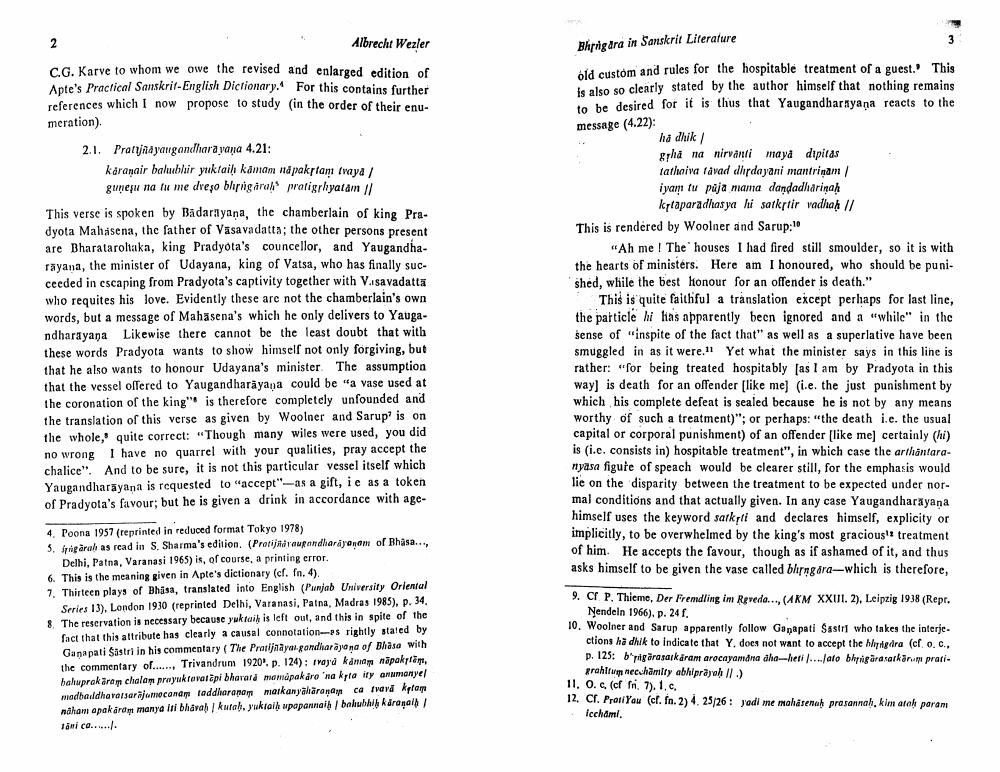Book Title: Bhrngara In Sanskrit Literature Author(s): A Wezler Publisher: A Wezler View full book textPage 2
________________ Bhrigara in Sanskrit Literature Albrecht Wezler C.G. Karve to whom we owe the revised and enlarged edition of Apte's Practical Sanskril-English Dictionary. For this contains further references which I now propose to study in the order of their enumeration) 2.1. Pratijna yaugandhara yana 4.21: karanair balubhuir yuktaih kamam id paketam (vaya / gunesu na tu me dreso blirrigarah praligrhyatam // This verse is spoken by Badar yana, the chamberlain of king Pradyota Mahasena, the father of Vasavadatta; the other persons present are Bharataroltaka, king Pradyota's councellor, and Yaugandharayana, the minister of Udayana, king of Vatsa, who has finally succeeded in escaping from Pradyota's captivity together with V.savadatta who requites his love. Evidently these are not the chamberlain's own words, but a message of Mahasena's which he only delivers to Yaugandharayana Likewise there cannot be the least doubt that with these words Pradyota wants to show himself not only forgiving, but that he also wants to honour Udayana's minister The assumption that the vessel offered to Yaugandharayana could be "a vase used at the coronation of the king is therefore completely unfounded and the translation of this verse as given by Woolner and Sarup' is on the whole,' quite correct: "Though many wiles were used, you did no wrong I have no quarrel with your qualities, pray accept the chalice". And to be sure, it is not this particular vessel itself which Yaugandharayana is requested to "accept"-as a gift, ie as a token of Pradyota's favour, but he is given a drink in accordance with age old custom and rules for the hospitable treatment of a guest. This is also so clearly stated by the author himself that nothing remains to be desired for it is thus that Yaugandharayana reacts to the message (4.22): ha dhik / gpha na nirvanti maya dipitas tathaiva lavad durdayani mantrinam / iyam tu pāja mama dandadharinak kytaparadhasya hi satkrtir vadhah // This is rendered by Woolner and Sarup: « Ah me! The houses I had fired still smoulder, so it is with the hearts of ministers. Here am I honoured, who should be puni. shed, while the best honour for an offender is death." This is quite faithful a translation except perhaps for last line, the particle hi has apparently been ignored and a "while" in the sense of "inspite of the fact that" as well as a superlative have been smuggled in as it were.11 Yet what the minister says in this line is rather: "for being treated hospitably as I am by Pradyota in this way) is death for an offender (like me) (i.e. the just punishment by which his complete defeat is sealed because he is not by any means worthy of such a treatment)"; or perhaps the death i.e. the usual capital or corporal punishment) of an offender (like me) certainly (hi) is (i.e. consists in) hospitable treatment", in which case the arthantaranyasa figure of speach would be clearer still, for the emphasis would lie on the disparity between the treatment to be expected under normal conditions and that actually given. In any case Yaugandharayana himself uses the keyword sarkyti and declares himself, explicity or implicitly, to be overwhelmed by the king's most gracious treatment of him. He accepts the favour, though as if ashamed of it, and thus asks himself to be given the vase called bhrngara-which is therefore, 4. Poona 1957 (reprinted in reduced format Tokyo 1978) 3. Spilgårah as road in S. Sharma's edition. (Protijdrawpandharyonom of Rhasa..., Delhi, Patna, Varanasi 1965) is, of course, a printing error. 6. This is the meaning given in Apte's dictionary (cf. fn. 4). 7. Thirteen plays of Bhasa, translated into English (Punjab University Oriental Series 13), London 1930 (reprinted Delhi, Varanasi, Patna, Madras 1985), p. 34. & The reservation is necessary because yuktail is left out, and this in spite of the fact that this attribute has clearly a causal connotationes rightly stated by Ganapati Sastri in his commentary ( The Pratijayo. pandiarajana of Bhase with the commentary of....... Trivandrum 1920. p. 124): rray'kamay napakylam, haluprokaram chalam proywkrevanapi bharard momapakdro 'na kyta iry anumanyel madaldha vasarājumocanam tad divaranam markanyāhārandy carvad kpop naham apakaram manya Ini bhavah / kural,yuktail papannai bahubby kdramall / Tani co....... 9. C P. Thieme. Der Fremdling im Reveda..., (AKM XXUL. 2), Leipzig 1938 (Repr. Nendeln 1966). p. 24f. 10. Woolner and Sarup apparently follow Ganapati Sastri who takes the interje ctions ha dhik to indicate that Y. does not want to accept the h igdra (cf. o. c.. p. 125: b'rilgārasaskaram arocayamda aho-heri/.../aro bhrrigarasarkanim prari grahltum necuhamiry abhiprayah // .) 11. O. c. (cf fr. 7). 1. c. 12. Cr. Prati You (cf. fn.2) 4. 25/26 : yadi me mahasenah prasannah, kin arah param icchami.Page Navigation
1 2 3 4 5 6 7 8 9 10 11 12 13 14 15 16 17 18 19 20 21 22 23
